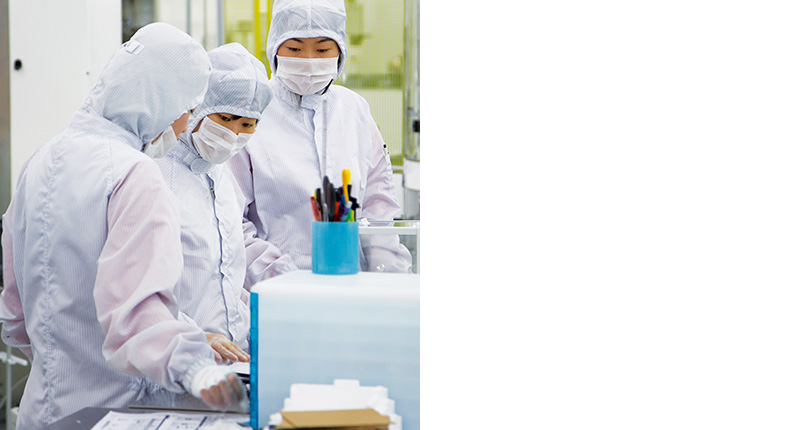Hanwha Chemical Envisions a World of Green Plastic
Hanwha Chemical is taking active steps to address global environmental concerns over the use and disposal of plastics. It is committing significant resources to the research and development of safer plastic products, more efficient production techniques, and reducing plastics’ overall environmental impact.
Changsuk Seo, Vice President of Corporate Planning at Hanwha Chemical, speaks about environmental concerns regarding plastic usage and Hanwha Chemical’s latest environmentally friendly plasticizer.

Changsuk Seo, Vice President of Hanwha Chemical, speaks about how Hanwha Chemical is working to reduce the environmental impact of plastic production and usage
- Q1. What is Hanwha doing to reduce the environmental impact of plastic?
-
At Hanwha, we’re trying very hard to make plastic safer for people and the environment. We’re constantly refining our production processes to reduce our emissions and eliminate waste.
We’re also actively developing environmentally friendly chemical products. For example, Hanwha’s patented
ECO-DEHCH is a non-phthalate-based plasticizer that is safe for humans.
- Q2. Can you elaborate on what ECO-DEHCH is?
-
Plasticizers are compounds added to plastic resins to make them more flexible. Traditional phthalate-based plasticizers can cause long-term health issues; thus, many governments have banned their use in toys and baby products.
ECO-DEHCH is an eco-friendly alternative that doesn’t produce any negative health effects. Manufacturers that use plastics made using ECO-DEHCH can label their products as “phthalate free” so that consumers will know that what they’re buying is safe.
- Q3. What are the biggest markets for such eco-friendly plastic products?
-
In terms of region, the United States and China have the highest interest in products like ECO-DEHCH. As for industries, companies that manufacture medical equipment, products for infants and children, and home goods (as in furniture, wallpaper, food packaging) are all looking for safer plastics.
- Q4. And how has market response been to products like Hanwha Chemical’s ECO-DEHCH?
-
ECO-DEHCH is receiving a very good response from the plastics market. As consumers’ concern for chemical products grow globally, our customers are experiencing, first-hand, the long-term benefits of adopting safe and eco-friendly compounds to produce consumer products.
→ Read more about how Jeil Wallpaper uses ECO-DEHCH here
Hanwha Chemical is actively responding to the rising market demand for safer compounds and our annual ECO-DEHCH production capacity will go up from 15,000 tons today to 65,000 tons by 2020 as we prepare to commence worldwide sales and distribution.

After eight years of research and development, Hanwha Chemical bridged the gap between durability
and safety for plasticizers with ECO-DEHCH
- Q5. What about the issue of plastic pollution?
-
Plastic is an extremely durable material that doesn’t break down when disposed of. This is regarded as a negative environmental impact.
Recently a concept called the “circular economy” is attracting attention. In simple terms, a circular economic model uses resource conservation and recycling to turn disposed materials back into raw materials.
Each year, approximately 50 million tons of plastic are disposed of without being recycled. The circular economy will reduce that number as it becomes more widely adopted and gets up to speed.
We’re researching how to produce plastic that will help support the circular economic model, such as converting waste plastic back into raw material that can be used to produce virgin plastic. We are also studying technology to produce plastics from raw materials created through microbial fermentation as well as biodegradable plastic which will break down into water, carbon dioxide and organic waste.
→ Read more about the Hanwha’s research into sustainability here
- Q6. Will people continue to use plastic in the future? If so, why?
-
Yes, because no other material is as versatile and durable as plastic. There really is no suitable alternative to plastic and using wood-based products can lead to more environmental problems. A leading international chemical consulting firm’s analysis indicates that even with recycling and tightening regulations, the demand for virgin plastic will still grow by around 3% annually.
Moving forward, the industry will take a more active role in researching safe and eco-friendly plastic to change consumers’ negative perception. Combined with improvements in the circular economy, recycling technologies, and manufacturing techniques, this will positively impact the way we produce, consume, and dispose of plastics in a more sustainable way.
Get the latest news about Hanwha, right in your inbox.
Fields marked with * are mandatory.
- Non-employee
- Employee




